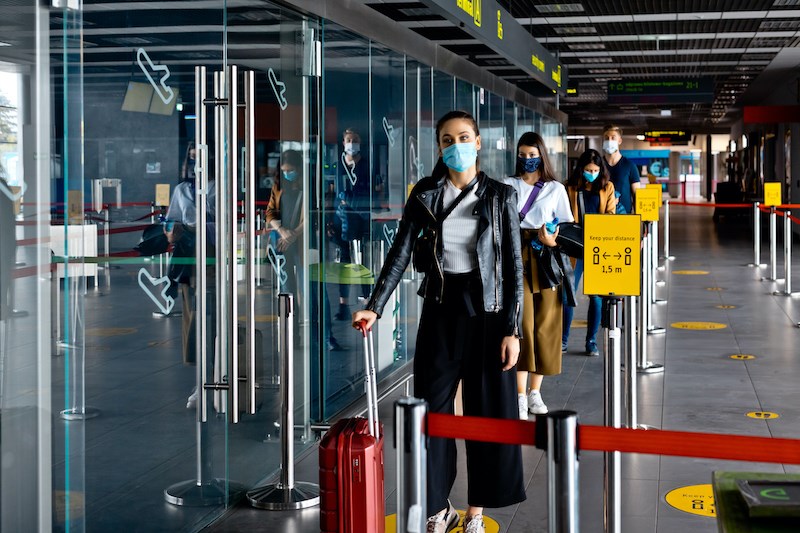While travelling internationally often comes with a hefty price tag, trips outside of Canada cost even more in the age of coronavirus.
Pandemic travel has more safety protocols, which includes everything from face masks to vaccine requirements to physical distancing and more.
But COVID-19 testing has proved particularly pricey and complicated for travellers.
British Columbians who have been eagerly anticipating the opening of the Canada-U.S. land border will be able to drive down beginning in early November. However, fully vaccinated land travellers will still need to get tested for COVID-19 — even if they are only heading down to the United States for the day.
Canada Border Services Agency (CBSA) spokesperson Rebecca Purdy told Vancouver Is Awesome that all Canadian travellers will need to take a test in order to re-enter the country.
"Travellers arriving by land or marine mode from the United States must take a molecular test in the United States within 72 hours of their planned entry into Canada," she explained.
"However, for short trips that are less than 72 hours, Canadian citizens, people registered under the Indian Act, permanent residents and protected persons travelling to the United States are allowed to do their pre-entry molecular test before they leave Canada.
"If the test is more than 72 hours old when they re-enter Canada, they will be required to get a new pre-entry molecular test in the United States."
So, while there isn't a testing requirement for fully vaccinated travellers to enter the United States, Canadians will need to get tested before they leave the country or before they return home.
Find out more about testing requirements for B.C. residents crossing the Canada-U.S. land border.
The cost of COVID-19 testing for travel
All Canadians five years of age or older must provide proof of a negative COVID-19 molecular test to return to the country. Screening tests for work or travel are not covered by public health services.
Due to overwhelming demand, many labs cannot guarantee a turnaround time for test results. Travellers who plan on staying in the United States longer than 72 hours will need to get tested south of the border. Some testing locations may offer a "rush" option, but if the test results do not arrive on time you won't be permitted to travel.
COVID-19 testing for travel may cost upwards of $150 CAD per person, although prices vary. Find out more information about the process and some local companies that provide the tests.
Testing may be considerably cheaper if you are in the United States, however.
Depending on what state you travel to, some pharmacies offer COVID-19 testing free of charge. Walgreens is the most popular, but some people have reported that they were tested for free at CVS Pharmacy and Rite Aid locations.
However, many locals say they had difficult experiences visiting clinics south of the border.
Testing experience was a "complete nightmare"
B.C. resident Mike Gallagher told V.I.A. that his experience travelling to the United States turned into a "complete nightmare" due to the Canadian testing requirements.
"My wife and I have made two trips to the United States since the quarantine was lifted for fully vaccinated Canadians," he explains.
"In each case getting the rapid antigen test to get the end of the US was a piece of cake. And in each case getting the molecular PCR test required by the Canadian government to return home was a complete nightmare."
In total, Gallagher said it cost him roughly $460 USD to get each of them tested for each trip.
"The biggest problem was that there were virtually no rapid PCR tests available either time," he describes. "So we had to wait [for] one to two days for results to return and on both trips... the results were actually delayed beyond that point."
On the first trip, which was to California, the couple was sitting on an airplane heading to their connecting flight in Seattle before the results showed up. On the second trip, which was to New York, the couple was informed by the clinic that they couldn’t "figure out how to text us the results and they requested that we return to the clinic to personally pick up the results."
In order to find a clinic for testing on the first trip, Gallagher said they had to drive 90 minutes each way to get to the nearest available clinic that would do the PCR testing.
"All in all, a horrible stressful way to return home to Canada, totally due to the silly requirement by our government that we not only need to be fully vaccinated."
Currently, the Government of Canada states that you should avoid all travel outside of the country until further notice due to the novel coronavirus pandemic.
If you do plan to travel, make sure you check the Travel Advice and Advisories page for your destination twice: once when you are planning your trip, and again shortly before you leave.
Find out more information about international and domestic travel for B.C. residents.



